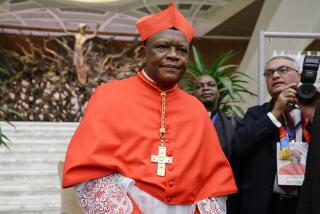Council Drops Support of Statement on Marriage
- Share via
The National Council of Churches has abruptly withdrawn its endorsement of an ecumenical statement it signed last week in support of traditional marriage.
The Rev. Robert Edgar, general secretary of the national council, said this week that he had withdrawn his support because the statement could be used to condemn same-sex unions, which he supports.
He said that he had failed to consult his member churches, most of them moderate-to-liberal mainline Protestant denominations. Edgar also offered an apology to those he said he may have hurt by signing the document.
The “Christian Declaration on Marriage” had been hailed as evidence of ecumenical cooperation. Others signing the declaration included the National Assn. of Evangelicals, the National Conference of Catholic Bishops and the Southern Baptist Convention.
Edgar’s about-face drew criticism from more conservative religious leaders, including the Rev. Kevin Mannoia, president of the National Assn. of Evangelicals. “I’m disappointed. I wish it had not happened,” Mannoia said in an interview. Mannoia said the statement was intended only to support traditional marriages and lower the divorce rate. Those issues are separate from the controversy over same-sex unions, he said.
Edgar changed his mind about the statement after appeals from advocates for gay rights. Among those who asked him to reconsider his support was the Rev. Gwynne Guibord, chief officer of the Office of Ecumenical and Interreligious Concerns for the Universal Fellowship of Metropolitan Community Churches, a denomination whose members are predominately lesbian or gay.
“I had a very frank talk with him and laid out how I felt the potential for damage was so profound and the harm that he had caused,” Guibord said. The marriage statement was filled with “code words” that were harmful to committed gay and lesbian relationships, she added.
“It’s not easy to say you’re wrong,” Edgar said in an interview. “But I came to the conclusion that my signature on the statement was hurtful to many of my friends.”
Some conservative religious leaders said Edgar’s decision should cause evangelicals to abandon a plan advanced by Edgar for the creation of an ecumenical body representing mainline Protestants, evangelicals, Catholics, Orthodox and the historic African American churches.
But Mannoia said he disagreed. “We need to consider it on its own merits,” he said, referring to Edgar’s plan. “The business we’re in is not a business of political maneuvering so one group or another has the upper hand.”
More to Read
Sign up for Essential California
The most important California stories and recommendations in your inbox every morning.
You may occasionally receive promotional content from the Los Angeles Times.













